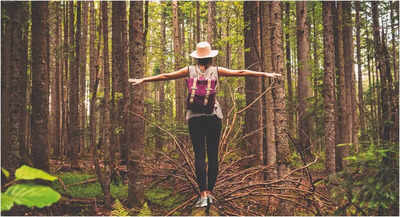ARTICLE AD BOX

For Mumbai-based Shantanu Pednekar, nature bathing clears the mental clutter caused by screens and constant notifications. He often visits his native place in Sawantwadi, nestled in the natural beauty of Konkan.
“During the monsoon, it feels like paradise,” he says adding, “One foggy morning, I stepped out, watched the hills glow in soft sunlight, heard birdsong, and simply sat still for hours, completely present, without my phone. That moment reminded me how powerful nature can be. We just need to slow down and truly notice it.”Nature bathing is becoming a popular way to relax the mind, especially for people in cities who feel tired or overwhelmed by screens and busy lives.A recent trend report from a visual discovery platform shows that more people want to take a digital detox. Many are turning to nature or a quiet book to slow down and escape from screens.WHAT IS NATURE BATHING- Nature bathing, also called forest bathing or Shinrin-yoku (a Japanese word), means spending quiet, relaxed time in nature, like a forest, park, or garden, not to exercise, but to slow down, use your senses, and enjoy the moment.
- Nature bathing is becoming popular with Gen Z. Searches for relaxing in nature have increased by 32%, as more choose calm settings like forests, the countryside, and nature parks.- Gen Z’s search trends reflect a growing interest in nature, with searches for nature retreats rising by 72%, beautiful nature views by 207%, forests with water by 174%, and nature parks by 16%IT’S MORE THAN JUST UNPLUGGING‘Need to take a step back’Architect Sayli Zantye found herself overwhelmed by endless notifications and a monotonous routine, making her realise the need to step back and disconnect.
“Yoga helped me centre myself,” she says, “but nature bathing offered something deeper. Sitting quietly, observing, even painting what I see—it's a way to slow down and fully feel the present moment. It’s more than calm; it’s a connection.”Pednekar adds, “If the week’s been hectic, I turn to nature over the weekend to recharge. I make it a habit to begin my day outdoors and let people know in advance, so I can stay undisturbed and limit my time on devices.”Nature heals better than screens off“Being in a natural setting — surrounded by greenery, fresh air, and gentle sounds — naturally soothes the nervous system. It helps to lower stress hormones such as cortisol, boost mood, and encourage a deeper kind of mindfulness,” says Dr Maitri Thakker, a clinical psychologist.She adds, “While device-free time at home is still beneficial, nature offers a layer of sensory and emotional restoration that can leave us feeling truly refreshed and grounded.”

HOW TO TRY IT YOURSELFStart simple: Begin with a morning walk in a nearby park or green spaceSkip the screen: Leave devices behind or use them only for emergenciesUse your senses: Listen to birdsong, watch the clouds, feel the breezeBe present: Observe small details: rustling leaves, moving water, shifting lightKeep it short: Start with 10–15 minutes and gradually extend your timeGo easy: No need for deep forest hikes; it’s about stillness, not distanceHOW LONG TO DETOX?A digital detox is more about creating small, intentional pauses that allow the mind to rest and reset.
According to experts, dedicating a full day each week to being device-free, perhaps over the weekend or while spending time with loved ones, can help restore emotional balance.
Every few months, taking a few days offline, especially in a calming environment, can feel like pressing a mental reset button. The key is to find a rhythm that suits your lifestyle and helps you feel more present, clear-minded, and emotionally nourished
Dr Maitri Thakker, a clinical psychologist
EMBRACING DIGITAL MINIMALISMAccording to a few who’ve tried it, it does. Zantye expresses, “My habit of mindless scrolling has reduced, and I use screens more intentionally now. I set clear boundaries and make sure my device use has purpose. Since weekends can be even busier than weekdays, I now start them with nature bathing and try to completely unplug.”
In a screen-filled world, spending time in nature isn’t just refreshing, it’s essential. A walk, some fresh air, or quiet journaling outdoors helps young professionals slow down, reconnect with themselves, and build a healthier, more mindful bond with the natural world
Sayli Zantye, a junior architect from Mumbai



.png)
.png)
.png)
















 4 hours ago
4
4 hours ago
4









 English (US) ·
English (US) ·